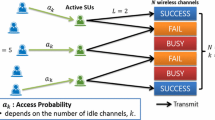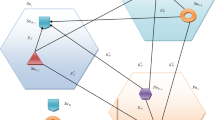Abstract
We investigate the cross-layer control problem for utility maximization in a multihop cognitive radio network. Specifically, we consider a scenario where wireless links of a secondary multihop wireless network opportunistically exploit a frequency band for data delivery when their neighboring primary users do not access it. We assume that the busy/idle status of the underlying channel in view of any particular secondary wireless link follows a two-state Markov chain and this information is only available at each secondary wireless link within one time slot delay. We develop a joint flow control, routing and scheduling algorithm that can achieve the total network utility arbitrarily close to optimality. In addition, we show that the proposed algorithm can maintain stability of all network queues while keeping collision probabilities with primary users below predetermined desirable values. To the best of our knowledge, this paper is the first attempt to design optimal control algorithms for multihop cognitive radio networks.
Access this chapter
Tax calculation will be finalised at checkout
Purchases are for personal use only
Preview
Unable to display preview. Download preview PDF.
Similar content being viewed by others
References
FCC. Spectrum policy task force report, FCC 02-155 (November 2002)
FCC. Facilitating opportunities for flexible, efficient, and reliable spectrum use employing cognitive radio technologies, notice of proposed rule making and order, FCC 03-322 (December 2003)
Haykin, S.: Cognitive radio: Brain-empowered wireless communications. IEEE J. Sel. Areas Commun. 23(2), 201–220 (2005)
Cordeiro, C., Challapali, K., Birru, D., Shankar, N.S.: IEEE 802.22: The first worldwide wireless standard based on cognitive radios. In: DySpan 2005 (November 2005)
Zhao, Q., Sadler, B.M.: A survey of dynamic spectrum access: Signal processing, networking, and regulatory policy. IEEE Signal Processing Mag., 79–89 (May 2007)
Etkin, R., Parekh, A., Tse, D.: Spectrum sharing for unlicensed bands. IEEE J. Sel. Areas Commun. 25(3), 517–528 (2007)
Le, L.B., Hossain, E.: Resource allocation for spectrum underlay in cognitive radio networks. IEEE Trans. Wireless Commun. 7(12), 5306–5315 (2008)
Kim, D.I., Le, L.B., Hossain, E.: Joint rate and power allocation for cognitive radios in dynamic spectrum access environment. IEEE Trans. Wireless Commun. 7(12), 5517–5527 (2008)
Chou, C.T., Shankar, N.S., Kim, H., Shin, K.G.: What and how much to gain by spectrum agile? IEEE J. Sel. Areas Commun. 25(3), 576–588 (2007)
Gandetto, M., Regazzoni, C.: Spectrum sensing: A distributed approach for cognitive terminals. IEEE J. Sel. Areas Commun. 25(3), 546–557 (2007)
Unnikrishnan, J., Veeravalli, V.V.: Cooperative sensing for primary detection in cognitive radio. IEEE J. Sel. Signal Processing 2(1), 18–27 (2008)
Tassiulas, L., Ephremides, A.: Stability properties of constrained queueing systems and scheduling policies for maximum throughput in multihop radio networks. IEEE Trans. Automatic Control 37(12), 1936–1948 (1992)
Georgiadis, L., Neely, M.J., Tassiulas, L.: Resource allocation and cross-layer control in wireless networks. Foundations and Trends in Networking 1(1), 1–144 (2006)
Urgaonkar, R., Neely, M.J.: Opportunistic scheduling with reliability guarantees in cognitive radio networks. In: IEEE INFOCOM (2008)
Neely, M.J.: Energy optimal control for time varying wireless networks. IEEE Trans. Information Theory 52(7), 2915–2934 (2006)
Devroye, N., Mitran, P., Tarokh, V.: Achievable rates in cognitive radio channels. IEEE Trans. Inf. Theory 52(5), 1813–1827 (2006)
Hou, Y.T., Shi, Y., Sherali, H.D.: Optimal spectrum sharing for multi-hop software defined radio networks. In: IEEE INFOCOM 2007 (May 2007)
Cao, L., Zheng, H.: Stable and efficient spectrum access in next generation dynamic spectrum networks. In: IEEE INFOCOM 2008 (2008)
Zhao, Q., Tong, L., Swami, A., Chen, Y.: Decentralized cognitive MAC for opportunistic spectrum access in ad hoc networks: A POMDP framework. IEEE J. Sel. Areas Commun. 25(3), 589–600 (2007)
Chang, N.B., Liu, M.: Optimal channel probing and transmission scheduling for opportunistic spectrum access. In: ACM MOBICOM 2007 (2007)
Huang, S., Liu, X., Ding, Z.: Opportunistic spectrum access in cognitive radio networks. In: IEEE INFOCOM 2008 (2008)
Le, L., Hossain, E.: OSA-MAC: A MAC protocol for opportunistic spectrum access in cognitive radio networks. In: IEEE WCNC 2008 (March 2008)
Su, H., Zhang, X.: Cross-layer based opportunistic MAC protocols for QoS provisionings over cognitive radio mobile wireless networks. IEEE J. Sel. Areas Commun. 26(1), 118–129 (2008)
Geirhofer, S., Tong, L., Sadler, B.M.: Dynamic spectrum access in the time domain: Modeling and exploiting white space. IEEE Commun. Mag. 45(5), 66–72 (2007)
Le, L.B., Modiano, E., Joo, C., Shroff, N.B.: Longest-queue-first scheduling under SINR interference model. In: ACM MobiHoc 2010 (2010)
Sharma, G., Mazumdar, R., Shroff, N.B.: On the complexity of scheduling in multihop wireless systems. In: ACM MOBICOM 2006 (2006)
Chiang, M., Low, S.H., Calderbank, A.R., Doyle, J.C.: Layering as optimization decomposition: A mathematical theory of network architectures. Proc. of the IEEE 95(1), 255–312 (2007)
Joo, C., Shroff, N.B.: Performance of random access scheduling schemes in multi-hop wireless networks. In: IEEE INFOCOM 2007 (2007)
Modiano, E., Shah, D., Zussman, G.: Maximizing throughput in wireless networks via gossiping. In: ACM SIGMETRICS (2006)
Sanghavi, S., Bui, L., Srikant, R.: Distributed link scheduling with constant overhead. In: ACM SIGMETRICS 2007 (June 2007)
Author information
Authors and Affiliations
Editor information
Editors and Affiliations
Rights and permissions
Copyright information
© 2012 ICST Institute for Computer Science, Social Informatics and Telecommunications Engineering
About this paper
Cite this paper
Le, L.B. (2012). Cross-Layer Control for Utility Maximization in Multihop Cognitive Radio Networks. In: Zhang, X., Qiao, D. (eds) Quality, Reliability, Security and Robustness in Heterogeneous Networks. QShine 2010. Lecture Notes of the Institute for Computer Sciences, Social Informatics and Telecommunications Engineering, vol 74. Springer, Berlin, Heidelberg. https://doi.org/10.1007/978-3-642-29222-4_3
Download citation
DOI: https://doi.org/10.1007/978-3-642-29222-4_3
Publisher Name: Springer, Berlin, Heidelberg
Print ISBN: 978-3-642-29221-7
Online ISBN: 978-3-642-29222-4
eBook Packages: Computer ScienceComputer Science (R0)




